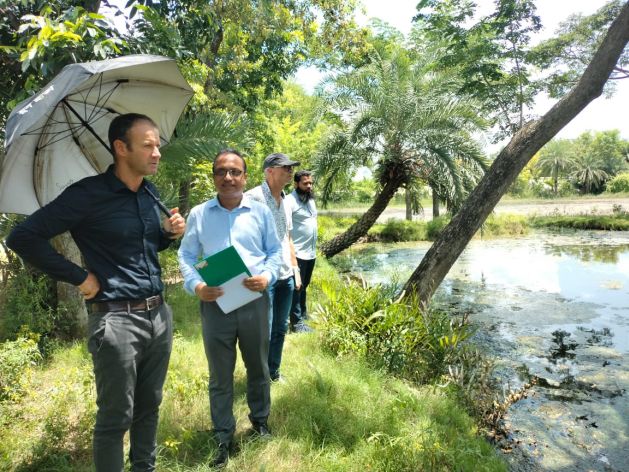Bangladesh Reaching Out To Global Partners To Transform Agriculture — Global Issues
DHAKA, Oct 10 (IPS) – Bangladeshi businessman Kazi Inam Ahmed is building his dream in a village near Rupsha River in Khulna, southern Bangladesh—to develop fish farming in the region, where climate change is reducing the ocean’s catch. He envisions creating small ponds, which would employ local climate affected fisherfolk, then exporting the international quality harvest to the Netherlands.
Inam, director of Gemcon Group, a conglomerate that includes Gemcon Food & Agricultural Products Ltd, is preparing his project thanks to advice from experts who visited recently from the Netherlands. “The Dutch co-partner of this project, Viqon Water Solutions, shared the preliminary design with us on 29 September. They will provide us with the final design in December. We will start our civil works after getting the final design.”
“For the first one or two years we’ll start fishing to gain experience,” adds the businessman in an interview. “We’ll see which types yield better harvests. After that, we’ll focus on some species that are very popular in different countries and can earn export dollars. I’d like to start with shrimp.”
How did Inam find his dream? In November 2021, he was included as one of the private-sector representatives on a Bangladesh Government mission to the Netherlands, organized to develop the capacity of the Ministry of Agriculture and foster matchmaking to strengthen the country’s food exports, agro-processing, food safety, and laboratory capacity.
Organized through the Hand in Hand Initiative (HiH) of the UN Food and Agriculture Organization (FAO), the delegation, which included five other agro-food companies, was led by Bangladesh Minister of Agriculture Dr Abdur Razzaque. It visited locations including the World Horticulture Centre, Wageningen University and Research, one of the world’s biggest onion exporting companies, and a range of other agricultural companies that grow and process produce that is exported globally.
Hand-in-Hand to improve agriculture
According to Robert D Simpson, FAO Representative in the country, “Bangladesh is a key country for HiH. Working with the government and private sector,” Simpson told IPS, “FAO develops value chains for profitable commodities, builds agro-industries, efficient water management systems, and digital services. The initiative also helps to reduce food loss and waste, and address climate challenges and weather risks.”

“The results will be raised incomes, improved nutrition and well-being of poor and vulnerable populations, and strengthened resilience to climate change,” added Simpson.
HiH is an evidence-based, country-owned and led initiative of the FAO to accelerate agricultural transformation, which also aims to eradicate poverty, end hunger and malnutrition, and reduce inequalities. The initiative was supporting 52 countries in Africa, Asia, Europe, Latin America, and the Middle East as of May 2022.
Speaking at the end of the November 2021 official trip, Razzaque said that Bangladesh will benefit from Dutch technology and know-how. “To be competitive in the global market in terms of price, quality, and safety, I think it’s important to keep updated with the latest technology in order to increase productivity.”
“We are looking forward to seeing the outcome of this project,” added the minister. “Hopefully it will be one of the successful initiatives by the government and private sector. The technologies that are coming to Bangladesh will help cope with the impact of climate change on agriculture.”
In addition, potato and onion experts from the Netherlands will train officials from the Department of Agriculture Extension (DAE), who will then train local farmers.
FAO Bangladesh has also organized several workshops and meetings with private sector and government officials to identify gaps and challenges for agricultural transformation.

French fries on the menu
ACI Agro was another private-sector member of November’s delegation. “It was a magnificent learning platform,” the firm’s managing director and CEO, Dr FH Ansarey, told IPS. “We were searching for a good potato variant. In Bangladesh there is a big market for French fries but no variant to produce them. Luckily we found a company to help with that.”
“We spoke with Schaap Holland, one of the prominent potato seeds companies of the Netherlands. They agreed to send six different variant potato seeds to our company. Their potato variants are perfect for making good French fries.”
Ansarey said ACI Agro has already located a farming area near the capital Dhaka. “If everything is OK we’ll start farming soon. Their seeds are next generation potatoes, which can grow within 60-65 days. The cost of cultivation is less than three-four percent of other variants due to low infestation of diseases. Seventy percent of the potatoes are above 80 grams so they can be easily exported.”
“So I must say it’s a very good opportunity for Bangladesh to move into the next generation of farming as well as become a global exporter.”
© Inter Press Service (2022) — All Rights ReservedOriginal source: Inter Press Service
Check out our Latest News and Follow us at Facebook
Original Source







